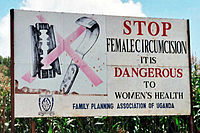
Photo from wikipedia
Despite concerted efforts to curb Female Genital Mutilation/Cutting (FGM/C), it is still a contributor to the high morbidity and mortality rates among females in Africa. According to available literature, the… Click to show full abstract
Despite concerted efforts to curb Female Genital Mutilation/Cutting (FGM/C), it is still a contributor to the high morbidity and mortality rates among females in Africa. According to available literature, the experiences of healthcare workers who care for the genitally mutilated females in Nigeria have not been described, hindering efforts towards ending this procedure through evidence-based, community-led interventions. This qualitative study described the experiences of healthcare workers caring for the genitally mutilated females in South-Eastern Nigeria. In-depth interviews conducted with 17 participants resulted in two themes and five sub-themes. The participants faced major challenges in caring for these females as the complications of FGM/C resulted in situations requiring advanced skills for which they were ill-prepared. Irrespective of this complex situation, the participants believed FGM/C was an age-old cultural practice; some even supported its continuation. The solution to this problem is not simple. However, educational programmes involving all cadres of healthcare workers could assist with eradicating this practice. Also, enforcing the anti-FGMC law could enhance the eradication of this procedure.
Journal Title: PLoS ONE
Year Published: 2021
Link to full text (if available)
Share on Social Media: Sign Up to like & get
recommendations!